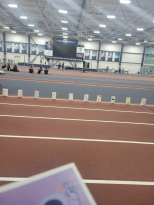Off the grid in Centre County—and liking it
Ten years ago, my father decided to build a house. He would do it singlehandedly, entirely of logs chopped from the trees on his personal patch of Centre County woodland, 15 miles northwest of State College. It wouldn't be a rustic retreat, but our permanent home.
I thought he was kidding. When I realized he wasn't, I thought he was crazy. So did everyone else.
But he bought the land cheap. It was completely undeveloped. Because of its relative isolation, there were no powerlines within a half-mile.
He had always meant to live a greener life, his original intention being to use solar panels to supplement a normal electricity supply. But for a company to run a line clear to our house would have cost something like $25,000. This forced him to make all his own electricity, relying only on what he could harvest from the sun.
Since the 1970s, conventional energy production has come under increasing criticism from the American public. Many have acknowledged the environmental dangers of producing coal, oil and nuclear power, as well as the fact that coal and oil are finite resources. As Americans develop greater environmental consciousness, we're becoming increasingly dissatisfied with the current energy situation.
A 2007 CBS-New York Times poll showed two-thirds of Americans think the U.S. electricity industry needs serious environmental improvements. Presumably this will increase as electricity costs rise and the industry can't meet demands.
According to the Department of Energy, renewable energy accounted for 8 percent of energy consumption and 10 percent of production in 2009. These numbers show the lingering hesitancy of Americans to go off the grid. But to a lot of people, like my dad, renewable energy like hydroelectric, wind, and solar power is looking more like a practical option.
Solar panels look like big windows. Their frames are aluminum, and the panes are large sheets of silicon imbedded with metal foil wires that absorb sunlight.
They're mounted outdoors, at an angle that allows them access to six hours a day of direct sunlight when available. There can be no obstructions, including trees.
The panels are connected via cables to a box indoors where batteries are stored. The energy from the panels charges the batteries, and the charge is converted to electric current by another part of the system.
Living entirely on solar power forces you to be a more efficient energy consumer. You only have as much power as you can make. Because all appliances are ultimately running on battery power, large appliances are out of the question.
We don't have heaters or air conditioners, washers, dryers, or big screen TVs. They just drain too much power.
Even the appliances we do have aren't left idly running. Energy conservation is the only way.
To get around this, we have a mini-fridge and microwave setup similar to that of a college dorm. We do have a normal-sized TV. We do laundry at laundromats. For heat, we have a wood-burning stove.
At first, rationing electricity seemed too Third World to me. My dad would flip a switch, cut the electricity, and I could imagine I was in Africa. But I learned how to micro-manage all the electricity I used.
The important technology gadgets people use daily are all small and can run on their own batteries. In the end, it's no big deal.
In winter, when the sun may not shine for weeks, we have a propane backup generator to recharge the batteries. In Pennsylvania, backup is essential.
Winter is also the only time the panels require any tampering. Pennsylvania is subject to heavy snow, and there may be no sun to melt it off the panels. In this case, my father climbs a ladder and clears them with a broom. Otherwise, the panels themselves are zero maintenance.
Living on solar energy has taught me about energy conservation. I think my initial qualms were typical of an American used to unlimited on-demand electricity, but it turned out to be easier than I thought. There are sacrifices for sure, but they can be overcome.
Even in a place notorious for its lack of sunshine, solar power can work. Against all expectations, life with solar power is basically normal. My story is an example of the feasibility of renewable energy sources.
Green energy is our future. Don't sweat it. I won't.







